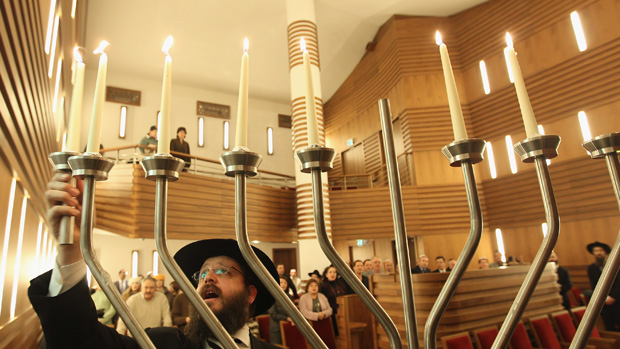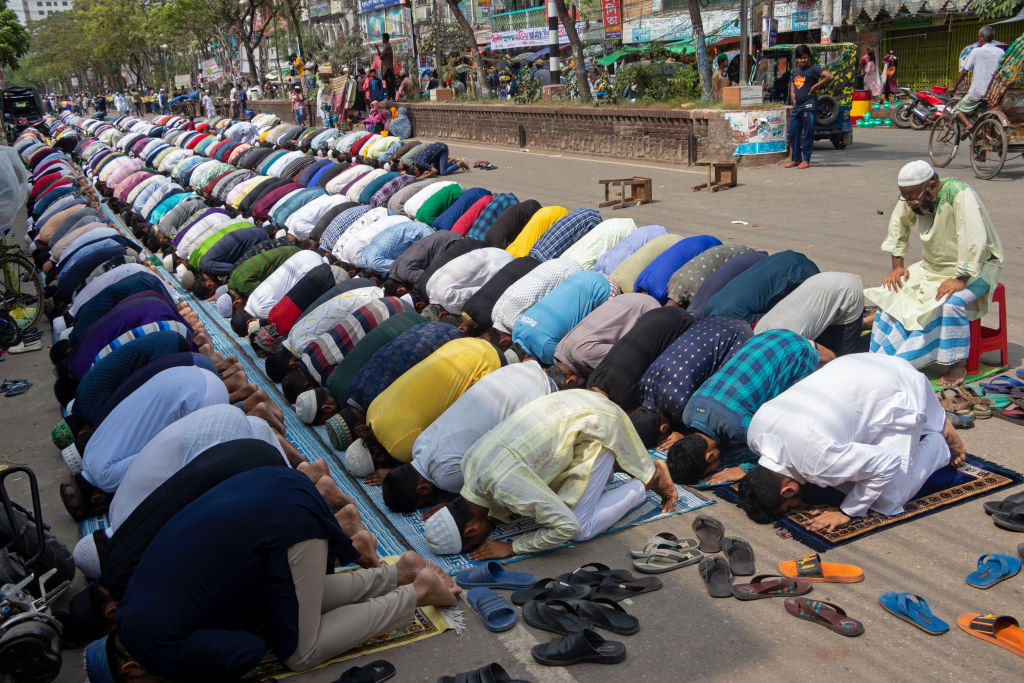What is Hanukkah and how is it celebrated?
One of the key festivals in the Jewish calendar begins this Sunday

A free daily email with the biggest news stories of the day – and the best features from TheWeek.com
You are now subscribed
Your newsletter sign-up was successful
Hundreds of thousands of Jews across the UK will this weekend begin their Hanukkah celebrations, at the start of an eight-day holiday marking one of the greatest miracles in Jewish history.
“Despite not being mentioned in the Torah”, Hanukkah is often described as “one of the most highly anticipated and joyous Jewish festivals of the entire year”, according to The Independent.
Also known as the “Festival of Lights”, the event “tells the story of the Maccabees, an army of rebels in Israel who revolted against the Seleucid Greek King Antiochus, who was trying to kill all the Jewish people”, the paper added. So what is Hanukkah and how is it celebrated?
The Week
Escape your echo chamber. Get the facts behind the news, plus analysis from multiple perspectives.

Sign up for The Week's Free Newsletters
From our morning news briefing to a weekly Good News Newsletter, get the best of The Week delivered directly to your inbox.
From our morning news briefing to a weekly Good News Newsletter, get the best of The Week delivered directly to your inbox.
Origins
Hanukkah marks the pre-biblical victory of a group of Jews known as the Maccabees over the Syrian-Greek rulers of Jerusalem in 167BC - and a miracle that followed it.
The victorious Maccabees rededicated the second Temple of Jerusalem, previously desecrated by their oppressors, who constructed within it an altar to the Greek god Zeus.
During the rededication, there was only enough untainted oil for the flames of the temple menorah - a seven branched candle holder - to burn for a single day, yet the flames lasted for the following eight evenings.
A free daily email with the biggest news stories of the day – and the best features from TheWeek.com
During the festival, many Jewish households place the menorah in a window to publicise "the miracle of the oil".
When is Hanukkah?
Unlike Christmas, which has a fixed date in the Gregorian calendar, the date on which Hanukkah begins depends on the Hebrew calendar, which is lunisolar. It takes place every year on the 25th day of the month of Kislev in the Hebrew calendar.
Because the date is set by the Hebrew calendar, it can take place any time from late November to late December in the Gregorian calendar. This year’s celebration begins on the evening of 28 November and continues for eight nights.
Hanukkah customs
Hanukkah is not a Sabbath-like holiday, meaning there is no obligation to refrain from activities forbidden on the Sabbath, such as work, cooking, cleaning or shopping.
Menorah: The traditions of Hanukkah revolve mostly around blessings and the kindling of the nine-branched candle holder known as the menorah or hannukiya. More oil or a new candle is added to the menorah after sunset on each evening of the eight-day festival. The ninth candle is called the shamash, or helper, and is used to light the other eight.
Food: During the festival, a particular emphasis is placed on the eating of fried food such as latke or potato pancakes and deep-fried doughnuts as a way to symbolise the significance of oil.
Hanukkah is also a time for eating dairy products. According to the BBC "the tradition has its roots in the story of Judith (Yehudit) who saved her village from the Syrians by making an offering of cheese and wine to the governor of the enemy troops."
Judith got the governor drunk and then when he had passed out, she beheaded him with his own sword and then took his head back to her village.
After the Syrian forces discovered that their commander had been killed, they fled.
According to Chabad.org, A typical Hannukah menu might include fried potato pancakes, sweet cream cheese rugelach (a type of pastry), strawberry jam–filled doughnuts (sufganiyot) covered in powdered sugar, fried apple fritters, cheese-filled doughnuts fried in oil and dipped in honey, and cheese blintzes.
Games: A popular game for children to play during Hanukkah is 'spin the dreidel'. A dreidel is a spinning top with a Hebrew letter inscribed on each of its four sides, that when put together form an acronym meaning: 'A great miracle happened here'. Stakes are placed, often in the form of sweets, and how the dreidel comes to rest determines how much a player wins.
Other games include trying to knock an opponent's dreidel over and trying to spin as many dreidels at once as possible.
The origin of playing with dreidels at Hanukkah are said to go back to a time when Greeks outlawed Jewish schools, so children would study in the forests. "When the alert came, the children would hide their texts and start playing with dreidels", Chabad.org says.
Gifts: Traditionally Jews would only exchange gifts on Purim or the Feast of Lots, a holiday that marks the saving of the Jews from a massacre during the Persian period of 539-330BC. But in the late 19th century, as consumerism grew, gift-giving shifted to Hanukkah in imitation of Christmas.
The most common gift given during Hanukkah is Gelt, which is the Yiddish word for money. Although monetary gifts are exchanged widely, children are generally given chocolate coins wrapped in gold or silver foil, just like ones that are available at Christmas.
It is thought that Gelt giving derives from Medieval Europe when children would be given money to hand to their local Jewish teachers at Hanukkah, in appreciation for education. Eventually children were also given money to encourage them with their Jewish studies.
-
 The environmental cost of GLP-1s
The environmental cost of GLP-1sThe explainer Producing the drugs is a dirty process
-
 Greenland’s capital becomes ground zero for the country’s diplomatic straits
Greenland’s capital becomes ground zero for the country’s diplomatic straitsIN THE SPOTLIGHT A flurry of new consular activity in Nuuk shows how important Greenland has become to Europeans’ anxiety about American imperialism
-
 ‘This is something that happens all too often’
‘This is something that happens all too often’Instant Opinion Opinion, comment and editorials of the day
-
 Weekend marks rare intersection of Easter, Passover, and Ramadan
Weekend marks rare intersection of Easter, Passover, and RamadanSpeed Read
-
 ‘Jews don’t count?’: the debate about racism and anti-Semitism
‘Jews don’t count?’: the debate about racism and anti-SemitismIn the Spotlight FBI criticised for claiming synagogue attack ‘not specifically related to the Jewish community’